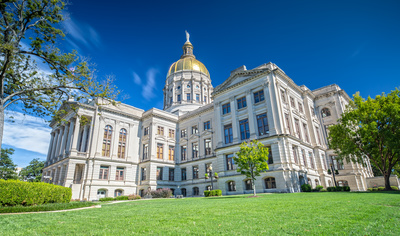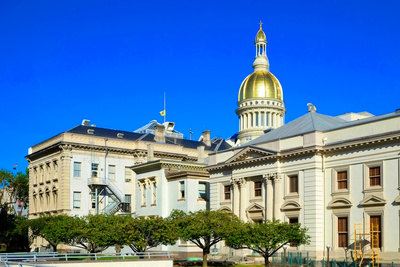
Elections & Campaigns, Energy & Environment
Nine States Face Key Public Utility Commission Elections Ahead of 2026
October 27, 2025 | Billy Culleton
November 6, 2024 | Bill Kramer
-e83f3b-1200px.jpeg)
Key Takeaways:
We'll update this post throughout the day as results continue to trickle in, especially for the nearly 6,000 state legislative races. Last updated on Nov. 8 at 10:30 AM ET.
With an already substantial lead in state political power, Republicans successfully defended key legislative majorities and should add some legislative chambers back to their column after some setbacks during the 2022 election cycle. Republicans currently control 23 state trifectas (i.e., when a single political party controls both chambers of the legislature and the governor’s mansion) and while they’re not likely to add to that number, this dominant trifecta map should mostly hold as we enter the 2025 legislative session.
As detailed below, Republicans have broken up Democratic trifectas in Michigan and Minnesota while retaining their trifecta in New Hampshire. The big remaining question is control over the legislative chambers in Arizona, where Republicans are defending one-seat majorities in both chambers to stop Democrats from gaining a trifecta in the Grand Canyon State.
While they were largely playing defense in state legislative chambers, Republicans appear to have translated their good night at the top of the ticket to state legislative races as well. Critically, Republicans have flipped the House in Michigan breaking up the Democratic trifecta and making the final two years of Gov. Whitmer’s (D) term much more difficult. Democrats had recently secured slim legislative majorities in 2022 after new maps were drawn by an independent redistricting commission. And in Minnesota, Republicans have picked up 3 of the 4 seats needed to take control of the House, which ties up the chamber at 67-67 seats a piece and would require a power-sharing agreement between the political parties. Democrats currently lead two House races by less than 30 votes each, which will trigger a recount. If these results hold, it would break up a second Democratic trifecta land essentially erase much of the state legislative gains Democrats struck in the 2022 elections.
Republicans should hold on to their trifecta in New Hampshire and are likely to add seats to both chambers. The GOP will also hold their long-time majority in the Wisconsin Assembly after a new court-ordered map opened up the potential for Democrats to flip the chamber. Although the new maps allowed Democrats to pick up ten seats in the Assembly and four seats in the Senate. And after initially looking like it might be another Republican flip, Democrats managed to hold their one-seat majority in the Pennsylvania House. While the Keystone State was the sole split legislature in 2024, we'll have at least three split legislatures in 2025.
Finally, things are too close to call in Arizona, where Republicans are trying to hold on to their 1-seat majority in both chambers. Initially, results indicated we might see a 15-15 tie in the Senate and Republicans maintain their 31-29 seat majority in the House. But as more ballots are counted, the Democrats' hope of tying the Senate appears to be dwindling. The key races are in LD4 where the Republican challenger has overcome an initial 38-vote deficit and now leads the incumbent Democratic state senator by over 1,000 votes. If that momentum shift continues in the handful of other close races, Republicans might maintain their 1-seat majority in the Senate after all and even expand their narrow majorities in both chambers.
Nationwide, Republicans should add to their 4,051 state legislative seats compared to the 3,266 seats currently held by Democrats.
Of the nearly 6,000 state legislative seats up for election this year, about a third of them were uncontested (i.e., only one major political party ran a candidate). Another third were in safe districts that weren’t expected to be competitive. Our favorite state elections forecasters at cnalysis rated only 1,116 of the 5,821 seats up for election this year to be competitive. These are pretty typical numbers for state legislative elections, but it translates to only a handful or so state legislative chambers that are at risk of flipping political control each cycle.
The other big legislative factor we’re keeping an eye on is veto-proof supermajorities. Entering election day, Democrats had hoped to break up the key GOP supermajorities in Kansas and North Carolina. It appears they have succeeded in North Carolina, which would be a welcomed sign for governor-elect Josh Stein (D). But they fell short in Kansas, with Republicans actually expanding their narrow supermajorities in both chambers, allowing them to override vetoes from Governor Kelly (D).
And in a surprising move, Republicans have broken the Democratic supermajorities in both chambers of the Vermont Legislature. Which will be a ribbon on top of Gov. Scott's (R) successful reelection yesterday and will stop a united Democratic legislature from overriding his vetoes.
As expected, this was a relatively unexciting year for gubernatorial races. The lone competitive race was an open seat in New Hampshire to replace retiring Gov. Sununu (R). In that race, U.S. Senator Kelly Ayotte (R) defeated former Manchester mayor Joyce Craig (D) to keep that seat in Republican hands.
The remaining ten gubernatorial elections this year were not expected to be competitive. And that’s what we saw as incumbent Republicans cruised to reelection in Vermont (Phil Scott), Montana (Greg Gianforte), and Utah (Spencer Cox). And while the incumbent’s party held on to the governor’s mansion in seven other states, the Democratic governor-elects in North Carolina (Josh Stein), Delaware (Matt Meyer), and Washington (Bob Ferguson) and Republican victors in Indiana (Mike Braun), Missouri (Mike Kehoe), North Dakota (Kelly Armstrong), and West Virginia (Patrick Morrisey) will be newcomers to the office.
Entering election day, there were 27 Republican governors to 23 Democratic governors. And in 2025, we’ll have the same count.
Seven of the nine lieutenant governor elections elected members of the incumbent party. There's a party flip in the Democrat's favor in North Carolina, where Rachel Hunt (D) has narrowly defeated Hal Weatherman (R) to replace Lt. Governor Robinson, who ran unsuccessfully for governor. And in Vermont we saw a party flip in the other direction, where challenger John Rodgers (R) narrowly defated incumbent Lt. Governor Zuckerman (D). With these two flips canceling each other out on the national count, the overall number of lieutenant governors across the country will be unchanged next year at 25 Republicans and 20 Democrats.
Another statewide official of note is state attorney general. This year, AG seats in ten states were up for election. While most incumbent parties retained AG seats, we did have one party flip in Pennsylvania, where Dave Sunday (R) defeated Eugene DePasquale (D) to replace the retiring Democratic incumbent. Four incumbents won reelection in Indiana, Missouri, Montana, and Vermont, and the incumbent party won open seats in Oregon, North Carolina, Utah, Washington, and West Virginia.
Like in the gubernatorial races this year, the seven elections for secretaries of state did not see a single party flip in 2024. Incumbents won reelection in Montana, North Carolina, Vermont, and Washington, while the incumbent party candidate was victorious for the open seats in Missouri, Oregon, and West Virginia.
State supreme courts are an often forgotten but key policymaking position. This year, 83 of the 344 state supreme court seats were up for election in 33 states. Eighteen of those states saw candidates running for either open seats or incumbents running against challengers. The remaining 15 states held up-or-down retention elections for incumbents where they won't face off against any challengers. Notably, despite a disappointing night overall in the state, Democrats in Michigan retained two liberal justices on the court, fending off conservative challengers to expand a 5-2 liberal majority on the state supreme court. Neighboring Ohio went in a different direction, electing conservative justices to replace two retiring liberal justices on the Court, expanding a dominant conservative majority of 6-1. Notably, justices on the general ballot are not affiliated by political parties in Michigan, whereas Ohio recently adopted a rule to place party affiliation next to judicial candidates' names on the ballot.
Voters also decided on 146 statewide ballot measures yesterday. Reproductive rights backers faced their first direct setback from voters post-Dobbs as Amdnemdnet 4 failed to reach the 60% approval needed for enactment in Florida, and similar measures are on track to fail in Nebraska and South Dakota, keeping abortion restrictions in place in those states. However, voters in Missouri approved an amendment to the state constitution creating a right to reproductive freedom, which will make the current strict abortion ban in place unconstitutional. A similar measure passed in Arizona, which currently has a 15-week abortion ban in place. And abortion rights measures passed in Colorado, Maryland, New York, Nevada (where voters will need to pass it again in 2026 to become effective), and Montana — all places where abortions are currently legal, although only because of court rulings in Montana.
Florida voters also rejected a recreational marijuana legalization measure on the ballot with similar measures on track to fail in North Dakota and South Dakota. Voters in Nebraska are on track to pass a medical marijuana legalization measure. Measures to raise the minimum wage to $15 an hour easily passed in Alaska and Missouri, but a measure to raise the minimum wage to $18 an hour in California is slightly below the 50% threshold with about half the votes counted in the Golden State.
Another ballot measure that failed to pass was Issue 1 in Ohio, which would have enacted an independent redistricting commission. Staying on election issues, ranked-choice voting and open primaries gained approval in DC, but similar measures are on track to fail in Colorado, Oregon, Idaho, Nevada, and Arizona. And voters in eight states approved constitutional amendments to explicitly prohibit noncitizens from voting, which is already prohibited in federal and state law.
Finally, Oregon voters overwhelmingly rejected Measure 18, which would have added a gross receipts tax for large corporations with the proceeds distributed to Oregon residents as a universal basic income-style program. And California’s Prop. 33, which would lift limits on localities imposing rent control, is garnering less than 40% approvals with about half of the votes reporting.

October 27, 2025 | Billy Culleton

October 17, 2025 | Sandy Dornsife

September 12, 2025 | Bill Kramer